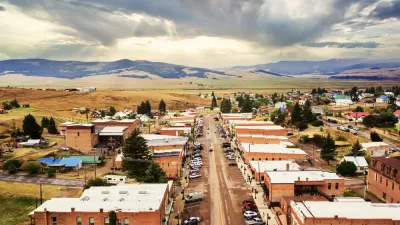Worried about feeding the world's growing population, especially as it increases meat consumption and farmland is impacted by climate change? No fear - improved crop technology and slowing world growth will allow farms to be converted to wildlands.
So says a new report (PDF) from the Program for the Human Environment at the Rockefeller University in New York. It goes by the title, "Peak Farmland and the Prospect for Land Sparing". Alister Doyle, Reuter's Environment Correspondent, explains that "the authors said that the idea of "Peak Farmland" was borrowed from the phrase "Peak Oil", the possibility that world use of petroleum is at its maximum." [See contributor's note below.]
The report projects that cropland needed to feed the world's growing population will decrease by 10% by 2060 due to "moderation of population and tastes and ingenuity of farmers", wrote co-author and Director for the Human Environment at Rockefeller University, Jesse Ausubel "in a speech about the study he led in the journal Population and Development Review."
"More crops for use as biofuels and increased meat consumption in emerging economies such as China and India, demanding more cropland to feed livestock, would not offset a fall from the peak driven by improved yields, it calculated."
The result, predict the authors, is that "almost 150 million hectares (370 million acres) could be restored to natural conditions such as forest by 2060."
However, the Rockefeller University report conflicts with a recent U.N. report.
"A June 2012 report by the U.N.'s Food and Agricultural Organization (FAO), however, said that an extra net 70 million hectares of land worldwide would have to be cultivated in 2050, compared with now: "Land and water resources are now much more stressed than in the past and are becoming scarcer," it said, referring to factors such as soil degradation and salinisation."
Doyle notes that "changing diet was also a big uncertainty as the world population headed toward about 10 billion and simultaneously grappled with problems of obesity and malnourishment."
[Contributor's note: The term, 'peak farmland' may appear confusing as the concept of 'peak oil' refers to demand outstripping supply, i.e. shrinking oil reserves will result in economic disruption as oil prices increase dramatically, e.g. $300/barrel. The term was coined prior to advent of oil production from unconventional sources, e.g. shale oil and oil sands. Peak Food was described in that light (escalating demand, shrinking supply) in Planetizen, 2008: "From 'Peak Oil' to 'Peak Food'"]
FULL STORY: "Peak farmland" is here, crop area to diminish: study

Maui's Vacation Rental Debate Turns Ugly
Verbal attacks, misinformation campaigns and fistfights plague a high-stakes debate to convert thousands of vacation rentals into long-term housing.

Planetizen Federal Action Tracker
A weekly monitor of how Trump’s orders and actions are impacting planners and planning in America.

In Urban Planning, AI Prompting Could be the New Design Thinking
Creativity has long been key to great urban design. What if we see AI as our new creative partner?

King County Supportive Housing Program Offers Hope for Unhoused Residents
The county is taking a ‘Housing First’ approach that prioritizes getting people into housing, then offering wraparound supportive services.

Researchers Use AI to Get Clearer Picture of US Housing
Analysts are using artificial intelligence to supercharge their research by allowing them to comb through data faster. Though these AI tools can be error prone, they save time and housing researchers are optimistic about the future.

Making Shared Micromobility More Inclusive
Cities and shared mobility system operators can do more to include people with disabilities in planning and operations, per a new report.
Urban Design for Planners 1: Software Tools
This six-course series explores essential urban design concepts using open source software and equips planners with the tools they need to participate fully in the urban design process.
Planning for Universal Design
Learn the tools for implementing Universal Design in planning regulations.
planning NEXT
Appalachian Highlands Housing Partners
Mpact (founded as Rail~Volution)
City of Camden Redevelopment Agency
City of Astoria
City of Portland
City of Laramie





























